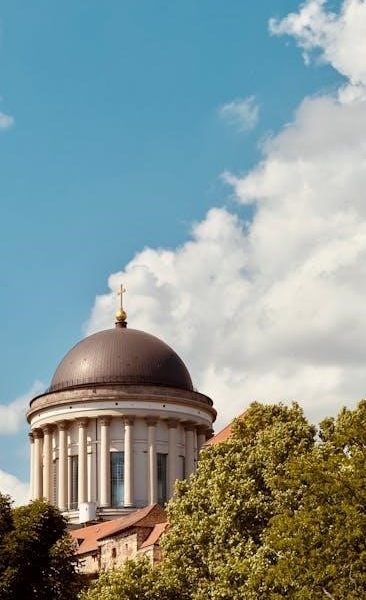The Catholic Church admits altering the Sabbath from Saturday to Sunday, citing divine authority, sparking significant debates among Protestant and Sabbatarian groups.
Overview of the Catholic Church’s Stance on the Sabbath
The Catholic Church openly acknowledges its role in changing the Sabbath from Saturday to Sunday, asserting its divine authority to adapt sacred traditions. It emphasizes that Sunday worship honors Christ’s resurrection, fulfilling the Sabbath’s purpose. The Church’s official documents, such as the Catechism, affirm this shift, framing Sunday as a day of communal celebration and spiritual renewal. This stance underscores the Church’s authority to interpret and evolve sacred practices while maintaining continuity with biblical teachings.
Historical Context of the Sabbath Observance
The Sabbath, rooted in the biblical account of creation, was sanctified as a day of rest and worship. Originally observed on Saturday, it was central to Jewish tradition and the Mosaic Covenant. Early Christians, however, began shifting their worship to Sunday, the day of Christ’s resurrection, marking a theological shift. The Catholic Church formalized this change, asserting its authority to adapt sacred traditions while maintaining spiritual continuity. This historical evolution reflects the Church’s role in shaping Christian practices, blending biblical roots with emerging doctrines.
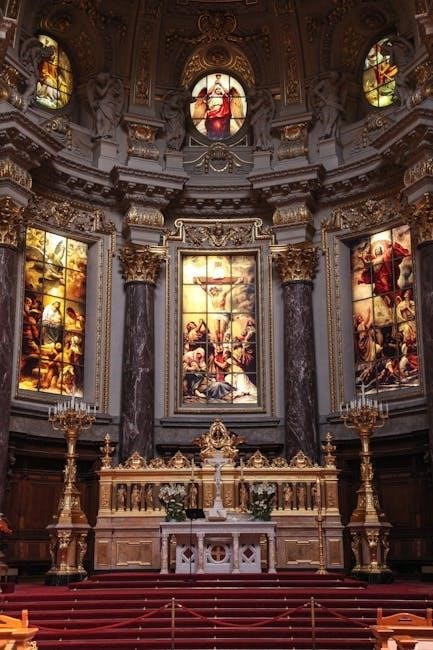
Historical Background of the Sabbath
The Sabbath’s origins trace back to Genesis, with God resting on the seventh day. It became central to the Mosaic Covenant, later evolving through early Christianity.
The Creation of the Sabbath in the Book of Genesis
The Sabbath’s origin is rooted in Genesis, where God rested on the seventh day after creation. This divine rest sanctified the day, making it holy. The Sabbath signifies God’s completion of creation and his blessings upon it. Although the word “Sabbath” isn’t explicitly mentioned in Genesis, the seventh day’s sanctification laid the groundwork for future commandments. This rest symbolizes God’s fellowship with humanity, emphasizing the day’s sacredness and its role in human worship, as later detailed in the Mosaic Covenant.
The Mosaic Covenant and the Seventh-Day Sabbath
The Mosaic Covenant solidified the Sabbath as a central commandment, with Exodus 20:8-11 mandating its observance. The seventh day, commemorating God’s rest after creation, became a holy day for the Israelites. This covenant emphasized rest, worship, and obedience, reinforcing the Sabbath as a unique sign of God’s people. The strict regulations, including prohibitions on work, mirrored Eden’s rest before sin, symbolizing humanity’s redemption and divine fellowship. This covenantal framework later influenced debates over the Sabbath’s observance in the Christian era.
Early Christian Worship Practices and the Transition to Sunday
Early Christians initially observed the Jewish Sabbath, but the resurrection of Christ on Sunday gradually shifted worship practices. The Roman Church played a pivotal role in formalizing Sunday as the day of worship, reflecting the day of Christ’s resurrection. This transition was influenced by the Council of Jerusalem, which hinted at moving away from strict Jewish traditions. Sunday worship symbolized the new covenant and distinguished Christians from Jews, especially after the destruction of the Temple in 70 AD. This shift laid the groundwork for the Catholic Church’s later theological justifications.

The Catholic Church’s Role in Changing the Sabbath
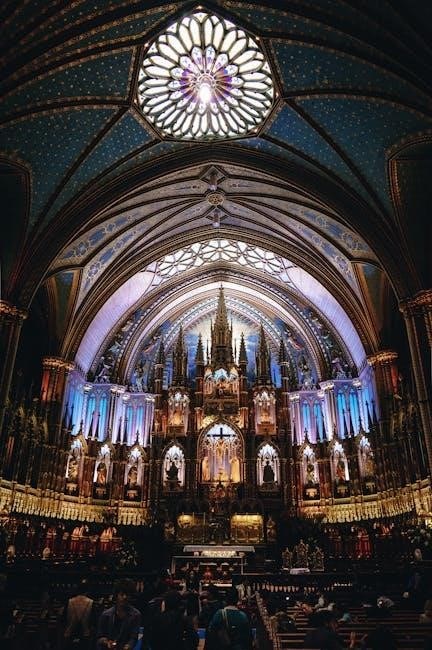
The Catholic Church claims divine authority to alter the Sabbath, shifting worship from Saturday to Sunday, as stated in official documents like the Catechism.
The Church’s Claim of Authority to Alter the Sabbath
The Catholic Church asserts its divine mandate to modify the Sabbath, citing its role as God’s representative on earth. This claim is rooted in the belief that Christ granted the Church authority to interpret and adjust sacred traditions. By transferring the day of worship from Saturday to Sunday, the Church emphasizes its hierarchical structure and the Pope’s infallibility in matters of faith. This stance has been reaffirmed in official documents, solidifying the Church’s position on its authority to change the Sabbath day.
References to the Change in Official Catholic Documents
Official Catholic documents confirm the Church’s role in changing the Sabbath. The Catechism of the Catholic Church (Section 2, Article 3) states that Sunday fulfills the Sabbath, emphasizing its observance as a holy day. Additionally, The Catholic Mirror, an official publication, explicitly acknowledges the Church’s authority in transferring worship from Saturday to Sunday. These documents underscore the Church’s position on its divine mandate to adapt sacred traditions, reinforcing its stance on the Sabbath’s transition.
Theological Justification for the Transition from Saturday to Sunday
The Catholic Church justifies the shift from Saturday to Sunday by linking it to Christ’s resurrection, which occurred on a Sunday. This event is seen as a fulfillment of the Sabbath’s purpose, symbolizing the dawn of a new covenant. Sunday is celebrated as the “Lord’s Day,” commemorating the triumph over death and sin. This theological framework emphasizes the resurrection’s significance, positioning Sunday as a day of renewal and worship, thereby replacing the traditional seventh-day Sabbath with a day that honors Christ’s redemptive act.
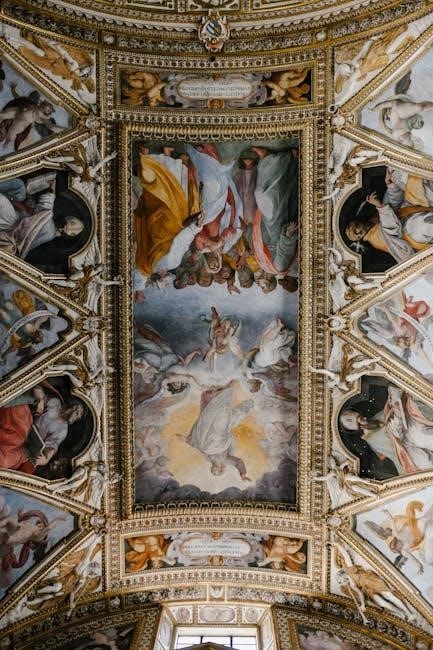
Controversy and Debate Surrounding the Sabbath Change
The shift from Saturday to Sunday sparked intense debate, with Protestant and Sabbatarian groups questioning the Church’s authority to alter divine commandments, leading to theological disputes.
Reactions from Protestant Churches and Sects
Protestant churches and sects have long questioned the Catholic Church’s authority to change the Sabbath, often citing biblical commandments as unalterable. Many view the shift as an overstep, arguing that only God can sanctify days. Some Protestant denominations continue to observe Sunday as a day of worship, while others, like Seventh-Day Adventists, emphasize Saturday as the true Sabbath. This divergence reflects broader theological disagreements about tradition versus scripture, highlighting the enduring impact of the Sabbath change on Christian unity.
Criticism from Seventh-Day Adventists and Other Sabbatarian Groups
Seventh-Day Adventists and other Sabbatarian groups strongly critique the Catholic Church’s change of the Sabbath to Sunday, arguing it contradicts biblical law. They emphasize that the seventh day, Saturday, remains the true Sabbath, as ordained by God in Genesis. These groups often view the change as a deviation from scripture and a sign of the Church’s overreach. Their critique is rooted in a literal interpretation of the Bible, asserting that the Sabbath is unchangeable and that Sunday worship lacks biblical support, reflecting their commitment to adhering strictly to scriptural teachings.
Within the Catholic Church, there have been internal discussions about the legitimacy of changing the Sabbath. Some scholars question the Church’s authority to alter a commandment given by God, while others defend it as a necessary evolution reflecting Christ’s resurrection. These debates highlight the tension between tradition and biblical literalism, as the Church maintains its stance on Sunday as the Lord’s Day, emphasizing its connection to the resurrection and the New Covenant, while addressing concerns about scriptural adherence and the role of Church authority in shaping worship practices. The Catholic Church’s decision to change the Sabbath is rooted in its interpretation of Jesus’ resurrection on Sunday and the New Covenant, emphasizing the Lord’s Day as a day of worship and renewal. Jesus observed the Sabbath but criticized rigid interpretations, emphasizing its purpose as a gift for humanity. He healed on the Sabbath, challenging legalistic traditions, and taught that the Sabbath was made for man, not man for the Sabbath. While He fulfilled the Law, His teachings hinted at a shift from strict observance, aligning with the Church’s later transition to Sunday as the Lord’s Day, symbolizing His resurrection and the dawn of the New Covenant.
The New Testament highlights Sunday as a significant day for early Christians, marking the Resurrection of Christ. The disciples gathered on Sundays after His resurrection, and the Holy Spirit descended on Pentecost Sunday. Paul often preached on Sundays, and collections were taken then. While not explicitly replacing the Sabbath, these practices laid the groundwork for Sunday worship, which the Catholic Church formalized, emphasizing it as the Lord’s Day and the fulfillment of the Sabbath’s spiritual significance. The New Testament emphasizes Christian liberty, freeing believers from strict adherence to the Sabbath law. Paul taught that neither circumcision nor uncircumcision, nor observance of days, justifies before God. The early Church embraced Sunday as the Lord’s Day, symbolizing Christ’s resurrection and the dawn of the new covenant. This shift reflected a theological transition, where the Sabbath’s rest was fulfilled in Christ, and Sunday became a day of celebration and worship, embodying the freedom and joy of Christian life. The shift from Saturday to Sunday transformed Christian worship practices, shaping modern traditions and fostering a distinct identity for Sunday as the Lord’s Day globally. The Catholic Church’s shift from Saturday to Sunday significantly influenced Christian worship, establishing Sunday as the primary day for communal gatherings and liturgical celebrations. This change aligned worship practices with the resurrection of Jesus, emphasizing Sunday as the “Lord’s Day.” Consequently, many Protestant denominations adopted this tradition, shaping their theological frameworks and communal practices. The transition also impacted ecumenical relations, as Sunday worship became a unifying element across diverse Christian communities, fostering a shared identity and liturgical unity. The Catholic Church’s admission of changing the Sabbath has influenced ecumenical relations, fostering dialogue among Christian denominations. While some Protestant and Sabbatarian groups criticize the shift, it has also encouraged unity through shared Sunday worship practices. Interfaith discussions, particularly with Jewish communities, highlight theological differences and mutual respect. The Church’s stance underscores its role in shaping Christian traditions, promoting collaboration, and addressing diverse perspectives in an effort to maintain harmony and understanding across faiths. Today, the Catholic Church views Sunday as a day of worship and rest, honoring Christ’s Resurrection. While acknowledging the historical shift from Saturday, modern teachings emphasize Sunday as the Lord’s Day, fulfilling the Sabbath’s purpose. The Church continues to uphold its authority in establishing this change, reflecting its role in shaping Christian traditions. This perspective balances historical roots with contemporary spiritual practices, ensuring the Sabbath’s essence endures in a modern context through Sunday observance. The Catholic Church’s admission of changing the Sabbath to Sunday highlights its significant influence on Christian traditions, sparking ongoing theological debates and discussions about worship practices. The Catholic Church’s shift from Saturday to Sunday as the day of worship holds profound historical and theological significance. This change, while controversial, reflects the Church’s authority in shaping Christian traditions. The transition underscored the move from Jewish practices to distinctly Christian observances, emphasizing Sunday as a celebration of Christ’s Resurrection. Despite criticisms, this adjustment has become a cornerstone of Christian worship worldwide, influencing ecumenical dialogue and modern religious practices. Its legacy remains a pivotal moment in Christian history.Internal Discussions Within the Catholic Church
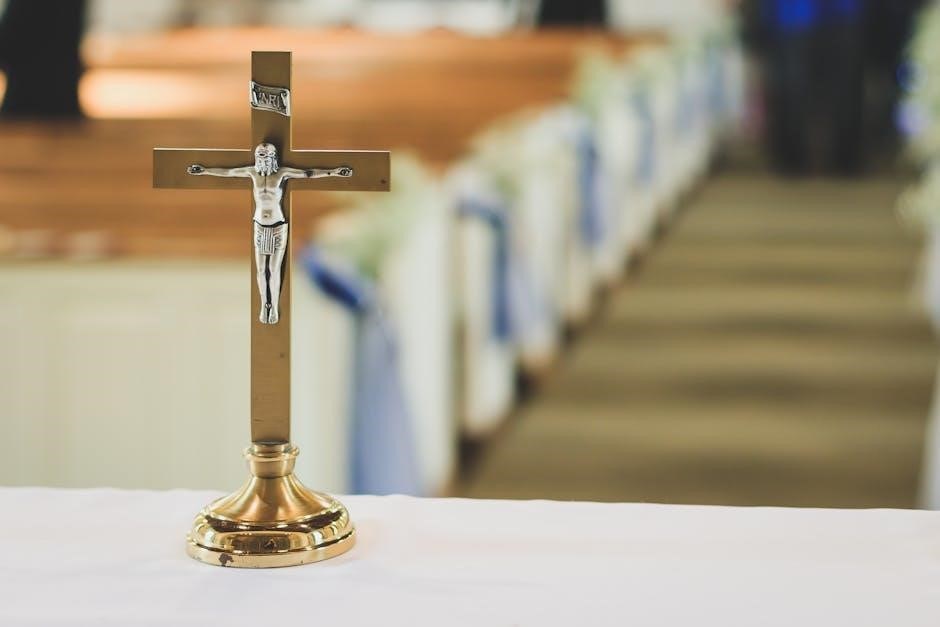
Biblical and Theological Foundations
Jesus’ Teachings on the Sabbath and Its Observance
New Testament References to Sunday as the Day of Worship
Christian Liberty and the Concept of the Lord’s Day
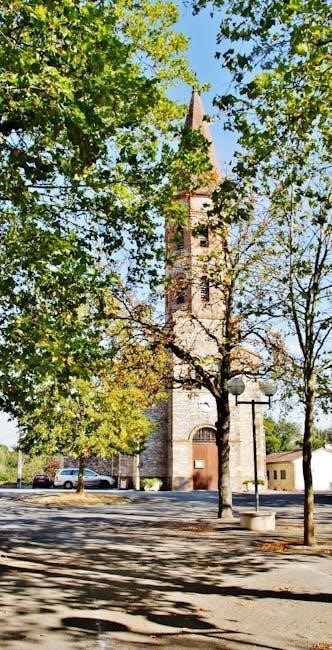
Impact and Legacy of the Sabbath Change
Effects on Christian Worship and Practice
Ecumenical Relations and Interfaith Dialogue
Modern Perspectives on the Sabbath in the Catholic Church
The Catholic Church openly acknowledges altering the Sabbath from Saturday to Sunday, citing divine authority and its role as a steward of Christian traditions. Official documents, such as the Catechism, confirm this change, emphasizing Sunday as the “Lord’s Day” and the fulfillment of the Sabbath. This shift, rooted in early Christian practices and the Resurrection, has shaped modern worship globally. The Church’s admission underscores its influence on liturgical and doctrinal evolution, impacting ecumenical relations and contemporary views on worship.Final Thoughts on the Significance of the Sabbath Change
